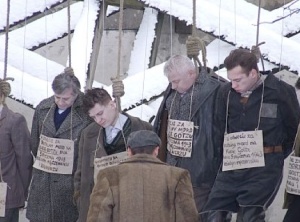Finally got around to seeing Czech Peace (orig. title Český mír), the documentary from Vít Klusák and Filip Remunda about the campaign surrounding a proposed US missile-defense radar base in the Czech Republic and Poland.
The film works or doesn’t, depending on what you want. Klusák and Remunda succeed in making the radar base in particular (and missile defense in general) look like a bad idea if you’re already inclined to think that way. The directors are unapologetic pranksters and provocateurs who enjoy poking fun at subjects that seem silly to them.
In the midst of shooting Czech Peace in 2008, the directors told me that
Unlike the anti-consumerism Czech Dream, Klusak and Remunda insist this time round they are not taking sides. Rather, they want to present the arguments for and against the base.
Maybe they changed their minds after our interview. Suffice it to say Czech Peace is not exactly an impartial examination of the debate. Of course, no one says it has to be, but I think the directors have missed an opportunity. Their new film will entertain a certain audience, but it will not win over anyone not already in their camp. Anyone who leans toward support US missile defense will simply be annoyed by it. Škoda.

